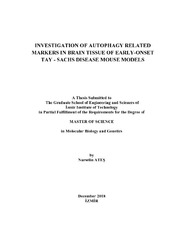Please use this identifier to cite or link to this item:
https://hdl.handle.net/11147/7198Full metadata record
| DC Field | Value | Language |
|---|---|---|
| dc.contributor.advisor | Seyrantepe, Volkan | |
| dc.contributor.author | Ateş, Nurselin | - |
| dc.date.accessioned | 2019-07-18T07:54:55Z | |
| dc.date.available | 2019-07-18T07:54:55Z | |
| dc.date.issued | 2018-12 | en_US |
| dc.identifier.citation | Ateş, N. (2018). Investigation of autophagy related markers in brain tissue of early-onset tay-sachs disease mouse models. Unpublished master's thesis, Izmir Institute of Technology, Izmir, Turkey. | en_US |
| dc.identifier.uri | https://hdl.handle.net/11147/7198 | |
| dc.description | Thesis (Master)--Izmir Institute of Technology, Molecular Biology and Genetics, Izmir, 2018 | en_US |
| dc.description | Includes bibliographical references (leaves: 67-76) | en_US |
| dc.description | Text in English; Abstract: Turkish and English | en_US |
| dc.description.abstract | Tay-Sachs disease is an autosomal recessively inherited lysosomal storage disorder that mainly affects the central nervous system. It is caused by mutations on the HEXA gene encoding α-subunit of β-Hexosaminidase A enzyme. The enzyme normally catalyses GM2 to GM3 conversion but when it is absent or dysfunctional the GM2 degradation is interrupted. Progressive accumulation of the undegraded GM2 ganglioside in neurons causes neurodegeneration and eventual death for the patient. The Hexa-/- mice generated as Tay-Sachs model was nearly normal and a bypass mechanism mediated by a sialidase was discovered. Neu3 sialidase involvement in ganglioside degradation in the Tay-Sachs disease pathology was reported and the Hexa-/-Neu3-/- mice was observed to mimic the neuropathologic and clinical phenotype of the disease. Therefore, it can be used as early-onset-Tay-Sachs disease mouse model. Lysosomal storage diseases have been reported as disorders of autophagy as the lysosomal accumulation expected to affects the autophagical-lysosomal pathway in one way or another. In the concept of our study comparative analysis of WT, Hexa -/- ,Neu3 -/- and Hexa -/- Neu3 -/- mice provided the information that early-onset Tay-Sachs disease model exhibit impairment in autophagic flux and secondary accumulation of autophagic components. The effect of abnormal GM2 and this secondary accumulation on apoptotic regulators and trigger factors were also investigated. In the light of our study, impairment in autophagic flux, increased oxidative stress and ER-stress are involved in the disease pathology of early-onset Tay-Sachs disease mouse model. | en_US |
| dc.description.abstract | Tay-Sachs hastalığı merkezi sinir sistemini etkileyen, ölümle sonuçlanan ve otozomal resesif bir şekilde aktarılan bir lizozomal depo hastalığıdır. GM2 gangliositinin yıkılmasını sağlayan β-Hexosaminidase A enziminin α-subunitini kodlayan HEXA genindeki bozukluk GM2 gangliositinin sinir hücrelerinde birikimine ve hastalık fenotipinin görülmesine sebep olur. Hasta bebekler doğduklarında normal olsalar da ilerleyici GM2 birikimi; sinir hücrelerinde artan ölüme, zihinsel ve motor fonksiyonlarında bozulmaya ve 2-4 yaşlarında da ölüme neden olur. Hastalığın ilk fare modeli olarak oluşturulan Hexa-/- fareler, yeterince GM2 birikimi göstermeyip hastalık fenotipini taklit etmemişlerdir. Yakın zamanda erken başlangıçlı Tay-Sachs Hastalığı fare modeli olarak üretilen Hexa-/-Neu3-/- fareler; Tay-Sachs hastalarında olduğu gibi, merkezi sinir sistemlerinde ilerleyici GM2 birikimi göstermiş ve hastalığın diğer patolojik özelliklerini de taklit etmiştir. Lizozomal depo hastalıklarının genel fenotipi olan lizozomlardaki anormal birikim otofajik-lizozomal yolağı da etkilemesi beklendiği ve bazı hastalıklarda gösterildiği için; lizozomal depo hastalıkları otofaji bozuklukları olarak da adlandırılmıştır. Bizim çalışmamız kapsamında WT, Hexa -/- ,Neu3 -/- ve Hexa -/- Neu3 -/- fareleri kullanılarak yapılan karşılaştırmalı analizler sonucunda; erken başlangıçlı Tay-Sachs hastalığı fare modelinde otofajik akışta bozulma olduğu ve otofajiyle alakalı proteinleril ikincil bir birikmeye sebep olduğu gösterilmiştir. Anormal GM2 ve bu ikincil birikiminin apoptotik düzenleyiciler ve tetikleyici faktörler üzerindeki etkisi de araştırılmıştır. Çalışmamız ışığında; erken başlangıçlı Tay-Sachs hastalığı fare modelinde otofajik akışta bozulma, artan oksidatif ve ER stresinin hastalık patolojisine etkisi olduğu tahmin edilmiştir. | en_US |
| dc.description.sponsorship | The Scientific and Technological Research Council of Turkey (TUBITAK 215Z083) | en_US |
| dc.format.extent | xiv, 76 leaves | en_US |
| dc.language.iso | en | en_US |
| dc.publisher | Izmir Institute of Technology | en_US |
| dc.rights | info:eu-repo/semantics/openAccess | en_US |
| dc.subject | Tay-Sachs disease | en_US |
| dc.subject | Autophagic flux | en_US |
| dc.subject | Autophagy | en_US |
| dc.title | Investigation of autophagy related markers in brain tissue of early-onset tay-sachs disease mouse models | en_US |
| dc.title.alternative | Erken başlangıçlı Tay-Sachs hastalığı fare modellerinin beyin dokusunda otofajiyle ilişkili belirteçlerin araştırılması | en_US |
| dc.type | Master Thesis | en_US |
| dc.institutionauthor | Ateş, Nurselin | - |
| dc.department | Thesis (Master)--İzmir Institute of Technology, Molecular Biology and Genetics | en_US |
| dc.relation.tubitak | info:eu-repo/grantAgreement/TUBITAK/KBAG/215Z083 | |
| dc.relation.publicationcategory | Tez | en_US |
| local.message.claim | 2022-06-15T16:35:42.576+0300|||rp02635|||submit_approve|||dc_contributor_author|||None | * |
| item.languageiso639-1 | en | - |
| item.fulltext | With Fulltext | - |
| item.openairecristype | http://purl.org/coar/resource_type/c_18cf | - |
| item.openairetype | Master Thesis | - |
| item.grantfulltext | open | - |
| item.cerifentitytype | Publications | - |
| crisitem.author.dept | 04.03. Department of Molecular Biology and Genetics | - |
| Appears in Collections: | Master Degree / Yüksek Lisans Tezleri | |
Files in This Item:
| File | Description | Size | Format | |
|---|---|---|---|---|
| T001879.pdf | MasterThesis | 13.2 MB | Adobe PDF |  View/Open |
CORE Recommender
Page view(s)
186
checked on Jul 22, 2024
Download(s)
158
checked on Jul 22, 2024
Google ScholarTM
Check
Items in GCRIS Repository are protected by copyright, with all rights reserved, unless otherwise indicated.